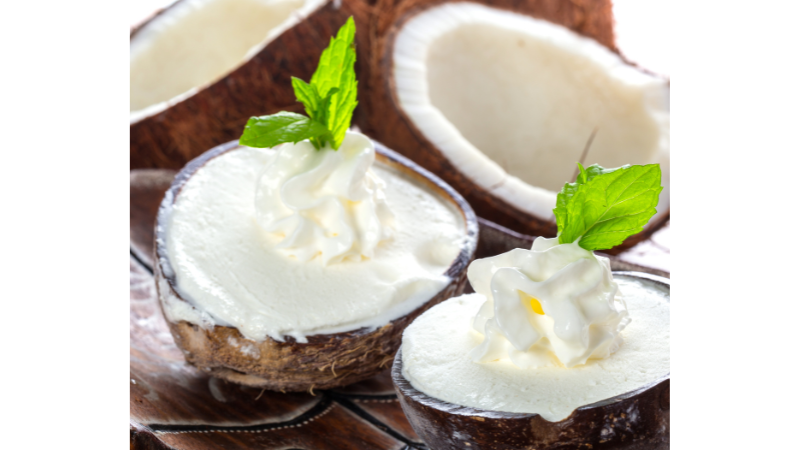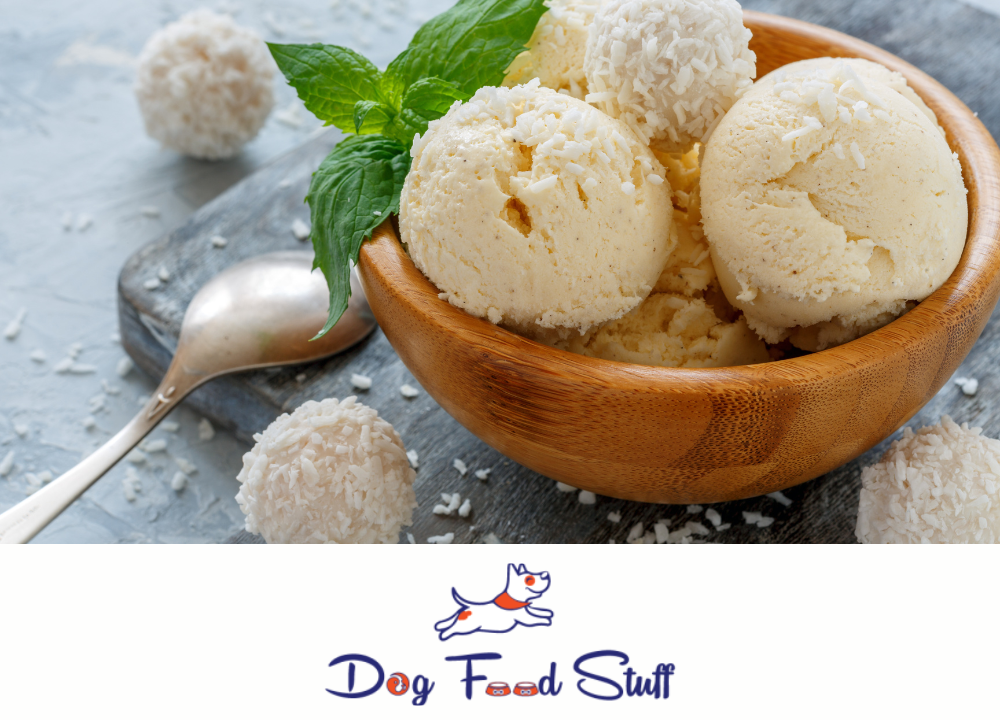What Are The Risks if a Dog Eats Coconut Ice Cream?
Eating coconut ice cream can be risky for dogs due to its dairy and sugar content. Dogs may suffer from lactose intolerance symptoms and potential upset stomachs.
Coconut ice cream, a tasty treat for humans, isn’t always a safe choice for our canine friends. Dogs differ from people in their ability to digest certain types of food, and ice cream, particularly coconut-flavored, can be troublesome. While coconut itself is not toxic to dogs, the ice cream’s high dairy content can lead to digestive distress since many dogs are lactose intolerant.
Sugars and artificial sweeteners, especially xylitol, commonly found in ice cream, can also pose serious health risks to dogs, including obesity, diabetes, and in the case of xylitol, even poisoning. As a pet owner, being aware of these potential dangers is vital for preventing unnecessary discomfort or a trip to the vet. Always consult with a veterinarian if you’re considering sharing human desserts with your dog, to ensure their safety and well-being.
Potential Risks Of Dogs Consuming Coconut Ice Cream
Potential risks of dogs consuming coconut ice cream may not be immediately obvious to pet owners. Dogs often eye human treats with longing. But just because it’s sweet and enjoyed by humans doesn’t mean it’s safe for our furry friends. Coconut ice cream might seem like a delicious indulgence for your canine companion, but it poses several risks you should consider before sharing a scoop.
Potential Choking Hazards In Coconut Ice Cream For Dogs
Small pieces in coconut ice cream can cause choking. Bits of coconut, nuts, or chunks of chocolate found in some ice creams are particularly dangerous. Dogs do not always chew food thoroughly, which can lead to these pieces getting stuck in their throat. Always check the ice cream for such hazards before considering a dog-safe option.
Dogs And Digestive Distress From Coconut Ice Cream
Ice cream is high in sugar and fats, which are hard for dogs to digest. Lactose intolerance can also cause stomach upset in canines. Symptoms include diarrhea, vomiting, and stomach pain, which can lead to dehydration and other health issues. Always prefer dog-specific treats to ensure their gastrointestinal comfort and health.

Allergic Reactions To Coconut Ice Cream In Dogs
- Some dogs may be allergic to coconut or other ice cream ingredients.
- Watch for signs of an allergic reaction, such as itching, swelling, or difficulty breathing.
- Introduce any new food to your dog’s diet gradually and in small amounts.
- Consult a vet immediately if you suspect an allergic reaction.
Choking Hazard
When dogs indulge in coconut ice cream, a real danger they face is the risk of choking. The combination of cold ice cream with various elements can create a risky situation for your furry friend. Let’s explore how the size and texture of added coconut flakes, as well as the presence of toppings, can become a safety concern.
Size And Texture Of Coconut Flakes
Coconut flakes are tricky. They can be large and oddly shaped. This means they don’t always go down easily. Large chunks can get stuck in a dog’s throat. Additionally, the texture of dried coconut is rough. It can scratch your dog’s throat, causing them to cough or choke.
Presence Of Nuts Or Other Toppings
Many ice creams come with extra toppings like nuts that are big choking hazards. Dogs don’t always chew their food well which means these elements can quickly become lodged in their throat. Always check the ice cream for toppings before sharing a lick with your pet pal.
Digestive Distress
Dogs often love sweet treats, like coconut ice cream. Yet, these treats might not love them back. Digestive distress can be a big problem if a dog indulges in coconut ice cream. One scoop can lead to an upset belly or more serious health issues. Let’s dive into why this tasty human dessert could spell trouble for our four-legged friends.
High Fat Content
Coconut ice cream is packed with fat. Too much fat can overwhelm a dog’s stomach. This can lead to pancreatitis, a painful condition. Symptoms include:
- Vomiting
- Diarrhea
- Lethargy
- Pain around the abdomen
If your dog eats coconut ice cream, watch for these signs. They need a vet if symptoms show.
Lactose Intolerance
Many dogs can’t digest lactose, which is in most ice creams. Lactose intolerance in dogs causes:
- Bloating
- Gas
- Stomach discomfort
- Changes in stool
Even a small lick can lead to uncomfortable days for your pup. So, it is best to avoid giving them any ice cream.

Allergic Reactions
Allergic reactions can occur in dogs just like in humans. While coconut ice cream may seem like a harmless treat for your furry friend, it’s important to be aware of the potential risks. An allergic reaction to coconut or other ingredients in ice cream may lead to discomfort or even a trip to the vet. Let’s delve into what dog owners need to keep an eye out for.
Coconut Allergy
Some dogs could be allergic to coconuts. It is rare, but signs include:
- Itchy skin
- Sneezing
- Runny nose
Look for these symptoms. If you see them, contact your vet.
Ingredients In The Ice Cream
Coconut ice cream could contain items that are not safe for dogs. These include:
| Ingredient | Potential Risk |
|---|---|
| Xylitol | Very toxic |
| Chocolate | Harmful |
| Nuts | Choking hazard |
Always check the ingredient list. Avoid ice cream with these items.
Symptoms To Watch For
Your dog just had a lick of coconut ice cream. Is there a cause for concern? Even though coconut itself is not toxic to dogs, coconut ice cream can pose risks due to added sugars, artificial sweeteners, and dairy. Knowing the signs of a potential reaction can help you respond quickly. Here are symptoms your furry friend may exhibit if they don’t agree with that sweet treat.
Coughing Or Gagging
Coughing or gagging soon after indulging could indicate that your dog’s throat is irritated. It may be a mild reaction, but it’s crucial to watch if it persists.
Vomiting Or Diarrhea
- Vomiting might happen if their stomach gets upset.
- Diarrhea could point to gastrointestinal disturbance.
These symptoms usually appear within 12 to 24 hours of consumption. Should these occur, make sure your dog has plenty of water to prevent dehydration.
Itching Or Skin Irritation
Watch out for signs of itching or skin irritation, such as scratching more than usual or red patches on the skin. This could mean your dog is having an allergic reaction to an ingredient in the ice cream.
Should any of these symptoms persist or worsen, contact your veterinarian immediately to ensure the health and safety of your pet.
Frequently Asked Questions
Is Coconut Cream Bad For Dogs?
Coconut cream contains high fat content which can be unhealthy for dogs and potentially lead to pancreatitis. Always consult a vet before introducing new foods to your pet’s diet.
What Is In Ice Cream That Is Toxic To Dogs?
Xylitol, a sugar substitute in some ice creams, is toxic to dogs. Also, lactose can cause digestive issues, as many dogs are lactose intolerant.
Is Coconut Toxic For Dog?
Coconut is not toxic to dogs, but it should be fed in moderation due to its high-fat content. Coconut water should also be offered sparingly as it contains potassium.
What Happens If My Dog Accidentally Eats Ice Cream?
If your dog eats ice cream, they may experience digestive upset. Lactose intolerance can lead to diarrhea and vomiting. Keep an eye on them, and provide plenty of water. Contact your vet if symptoms persist or worsen.
Conclusion
Concluding our discussion on dogs consuming coconut ice cream, it’s crucial to weigh the benefits against potential health risks. Always consult your vet first and consider lactose intolerance and possible allergic reactions. Moderation and vigilance ensure your furry companion enjoys a tasty treat without compromising their well-being.
Remember, a pet’s health is always a top priority.

